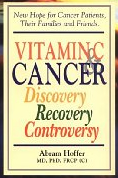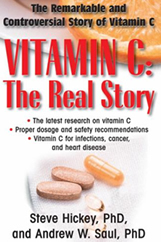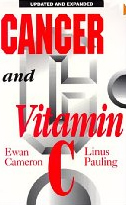Orthomolecular Medicine Perspective
High-Dose Nutritional Therapy
Vitamins: It's the Dose that Does It!
How Much Do I Need & Is it Safe?
⚠️ Important Medical Warning
High-dose vitamin therapy can have serious risks and should only be undertaken under qualified medical supervision.
Megadose vitamin therapy may interact with medications, cause adverse effects, and is not appropriate for everyone. Individual needs vary significantly based on health status, medications, and other factors.
Always consult with healthcare professionals familiar with orthomolecular medicine before implementing high-dose vitamin protocols. Self-medication with megadoses can be dangerous.
📄 Source Information
Reprinted with permission from: Orthomolecular Medicine News Service
Publication Date: February 2, 2009
Editor: Andrew W. Saul, Ph.D.
📚 Key Research Literature

Vitamin C & Cancer

Vitamin C: The Real Story

The Future Is Now

Cancer and Vitamin C
🎯 The Central Thesis
"It's the Dose that Does It"
Thousands upon thousands of nutritional research studies provide evidence that vitamins do help prevent and treat serious diseases, including cancer and heart disease, when the nutrients are supplied in sufficiently high doses. High doses are required. Low doses fail.
📰 Media Bias Critique
There is a spin to most media reporting on vitamin research. The recent anti-vitamin media blitz, led by the Associated Press and USA Today, provides yet another demonstration of how vitamin therapy has been tested with inadequate doses and then declared ineffective.
🔍 Media Sources Referenced
- • Associated Press: "Vitamins C and E don't prevent heart disease" (Nov. 9, 2008)
- • USA Today supplements study
👨⚕️ Expert Medical Perspectives
Thomas Levy, M.D., Cardiologist
"The three most important considerations in effective vitamin C therapy are dose, dose, and dose. If you don't take enough, you won't get the desired effects."
Abram Hoffer, M.D., Ph.D.
"Drs. Wilfrid Shute and Evan Shute recommended doses from 400 IU to 8,000 IU of vitamin E daily. The usual dose range was 800 to 1600 IU but they report that they had given 8,000 IU without seeing any toxicity."
Clinical Success: The Shutes successfully treated over 35,000 patients with vitamin E.
Robert F. Cathcart III, M.D.
"I have been consulted by many researchers who proposed bold studies of the effects of massive doses of ascorbate (vitamin C). Every time the university center, the ethics committee, or the pharmacy committee deny permission for the use of massive doses of ascorbate and render the study almost useless. Seasoned researchers depending upon government grants do not even try to study adequate doses."
📊 Dose Comparison Analysis
❌ Low Doses Used in Recent JAMA Study
All the recent, much touted JAMA study does is confirm what we already know: low doses do not work.
Study Doses (Ineffective)
- • Vitamin E: 400 IU every OTHER day
- • Vitamin C: 500 mg/day
Predicted Results
These low doses predictably showed no benefit, confirming the dose-response relationship.
✅ Proposed Effective Doses
Try that same study with proper therapeutic doses and the difference would be unmistakable:
Therapeutic Doses
- • Vitamin E: 2,000-4,000 IU every other day (1,000-2,000 IU/day)
- • Vitamin C: 15,000-30,000 mg/day
Expected Results
Investigators using vitamins E and C in high doses have consistently reported success.
💡 Medical Principle
Any physician, nurse, or parent knows that a dose of antibiotics that is one tenth, or one-hundredth, of the known effective dose will not work. Indeed, it is a cornerstone of medical science that dose affects outcome. This premise is accepted with pharmaceutical drug therapy, but not with vitamin therapy.
🛡️ Safety Considerations
📈 Safety Statistics
The most frequently proffered reason against high-dose vitamins is the allegation that "high doses of vitamins are not safe." That is a myth.
🏥 Poison Control Data
25 years of national poison control statistics show that there is not even one death per year from vitamins. Half of Americans take vitamin supplements every day. So where are the bodies?
📚 Research Evidence
Decades of physicians' reports and controlled research studies support the use of large doses of vitamins. Check the research literature and see for yourself exactly who is being harmed by vitamins. Aside from the pharmaceutical industry, virtually nobody.
⚠️ Important Safety Note
While vitamin safety statistics are favorable, high-dose vitamin therapy still requires proper medical supervision. Individual responses can vary, and certain medical conditions or medications may contraindicate megadose therapy. Always work with qualified healthcare practitioners.
🚫 Research Limitations
🏛️ Institutional Barriers
High doses of vitamins are deliberately not used in many research studies. This creates a systematic bias against finding positive results.
🔬 Research Obstacles
- • University centers deny permission for massive doses
- • Ethics committees restrict high-dose studies
- • Pharmacy committees render studies "almost useless"
- • Researchers depending on government grants don't even try to study adequate doses
📺 Media Influence & Bias
💰 Financial Influences
In the broadcast and print media, vitamin therapy is marginalized at best and derided at worst. Is this merely laughable, or is there method to it?
💊 Pharmaceutical Advertising
One may start by asking, who does this serve? Could it possibly be the media's huge advertising-cash providers, the pharmaceutical industry? Pharmaceutical advertising money buys authors, ad space, influence, and complicity. Unfortunately, this is as true in the newspapers as it is in the medical journals.
📰 Transparency Call
Let the news media begin by disclosing exactly where their advertising revenue comes from. It may explain where the spin on their articles comes from, too.
🎭 Portrayal vs. Reality
Yet to hear the media (and JAMA) tell it, vitamins are a Granny's folk remedy: a buggy- and barrel-stave technology that just doesn't make it. This portrayal ignores decades of scientific research and clinical success with orthomolecular approaches.
🧬 Orthomolecular Medicine
🏥 Nutritional Medicine Approach
Nutritional Medicine is Orthomolecular Medicine
Orthomolecular medicine uses safe, effective nutritional therapy to fight illness. For more information: http://www.orthomolecular.org
The peer-reviewed Orthomolecular Medicine News Service is a non-profit and non-commercial informational resource.
👥 Editorial Review Board
🎓 Expert Panel
- • Carolyn Dean, M.D., N.D.
- • Damien Downing, M.D.
- • Harold D. Foster, Ph.D.
- • Steve Hickey, Ph.D.
- • Abram Hoffer, M.D., Ph.D.
- • James A. Jackson, PhD
- • Bo H. Jonsson, MD, Ph.D
- • Thomas Levy, M.D., J.D.
- • Erik Paterson, M.D.
- • Gert E. Shuitemaker, Ph.D.
Editor: Andrew W. Saul, Ph.D.
Contact: [email protected]
Subscribe: http://www.orthomolecular.org/subscribe.html
The above provides a general overview on this topic and may not apply to everyone. Any treatment protocol should be discussed with a qualified healthcare practitioner.